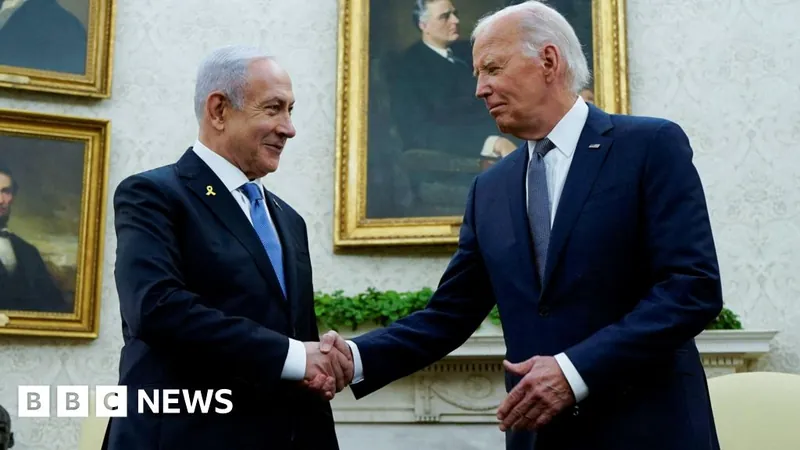
Biden and Netanyahu Engage in Critical Gaza Truce Discussions as Tensions Rise
2025-01-13
Author: Ling
In a crucial phone call this week, U.S. President Joe Biden and Israeli Prime Minister Benjamin Netanyahu are reportedly deep in discussions regarding a potential ceasefire in Gaza and the release of hostages held by Hamas. With Biden nearing the end of his term and momentum seemingly building around this issue, the stakes could not be higher.
Recent reports indicate that Israel and Hamas are inching closer to a deal, although significant uncertainties linger regarding the details of the agreement. The White House emphasized the "fundamentally changed regional circumstances" that now prevail following Israel's truce with Hezbollah in Lebanon, shifts in power dynamics after the downfall of Syria's Assad regime, and diminished Iranian influence in the area.
Netanyahu has briefed Biden on the directives he provided to senior negotiators in Doha, where indirect negotiations involving Qatari, U.S., and Egyptian officials are underway. Notably, during the call, Biden underscored the urgent need for a ceasefire in Gaza and emphasized the importance of ensuring the safe return of hostages alongside a surge in humanitarian aid—conditional on halting hostilities.
On the ground, the situation remains tense. Just a day prior to their conversation, Netanyahu dispatched a high-profile Israeli security team—including heads of the Mossad and Shin Bet agencies—to participate in the negotiations. He is also reportedly meeting with members of his cabinet who are resistant to the idea of a ceasefire, trying to dissuade them from resigning in light of ongoing discussions.
Adding to the diplomatic flurry, UK Foreign Secretary David Lammy met with his Israeli counterpart in Jerusalem to discuss advancements toward a potential deal. Meanwhile, former President Donald Trump's Middle East envoy, Steve Witkoff, conferred with Netanyahu, emphasizing the urgency of reaching an agreement before the impending inauguration of Trump on January 20.
Trump has controversially remarked that “all hell would break loose” if hostages were not released prior to his return to office, amplifying concerns about the potential escalation of violence. U.S. Secretary of State Antony Blinken stated earlier this week that an agreement appears "very close" and expressed hope in finalizing the deal based on proposals laid out by Biden in May.
Despite these diplomatic overtures, ambiguity remains over key issues such as whether the initial truce could lead to a lasting ceasefire and the Israeli military's potential withdrawal from Gaza. Experts, including Anshel Pfeffer, The Economist's Israel correspondent, remain skeptical about the quick realization of an agreement. "We've been here so many times before," he warned, stressing the need for official announcements and tangible outcomes before a sense of optimism can take hold.
The war, ignited by Hamas’s surprise attack on southern Israel on October 7, 2023, has already taken a devastating toll. Around 1,200 Israelis lost their lives, and 251 individuals were taken hostage. Israel has responded with a military offensive aimed at dismantling Hamas's capabilities. The toll on Gaza has been catastrophic, with Hamas-run health ministry reporting over 46,500 fatalities due to the conflict.
The urgency for both sides to reach an agreement is palpable, with fears that the situation could worsen under a Trump administration. As the clock ticks down, the hope for peace and the safe return of hostages hangs in the balance. Will a breakthrough be achieved before this new chapter in U.S. leadership unfolds? Only time will tell.




 Brasil (PT)
Brasil (PT)
 Canada (EN)
Canada (EN)
 Chile (ES)
Chile (ES)
 Česko (CS)
Česko (CS)
 대한민국 (KO)
대한민국 (KO)
 España (ES)
España (ES)
 France (FR)
France (FR)
 Hong Kong (EN)
Hong Kong (EN)
 Italia (IT)
Italia (IT)
 日本 (JA)
日本 (JA)
 Magyarország (HU)
Magyarország (HU)
 Norge (NO)
Norge (NO)
 Polska (PL)
Polska (PL)
 Schweiz (DE)
Schweiz (DE)
 Singapore (EN)
Singapore (EN)
 Sverige (SV)
Sverige (SV)
 Suomi (FI)
Suomi (FI)
 Türkiye (TR)
Türkiye (TR)
 الإمارات العربية المتحدة (AR)
الإمارات العربية المتحدة (AR)